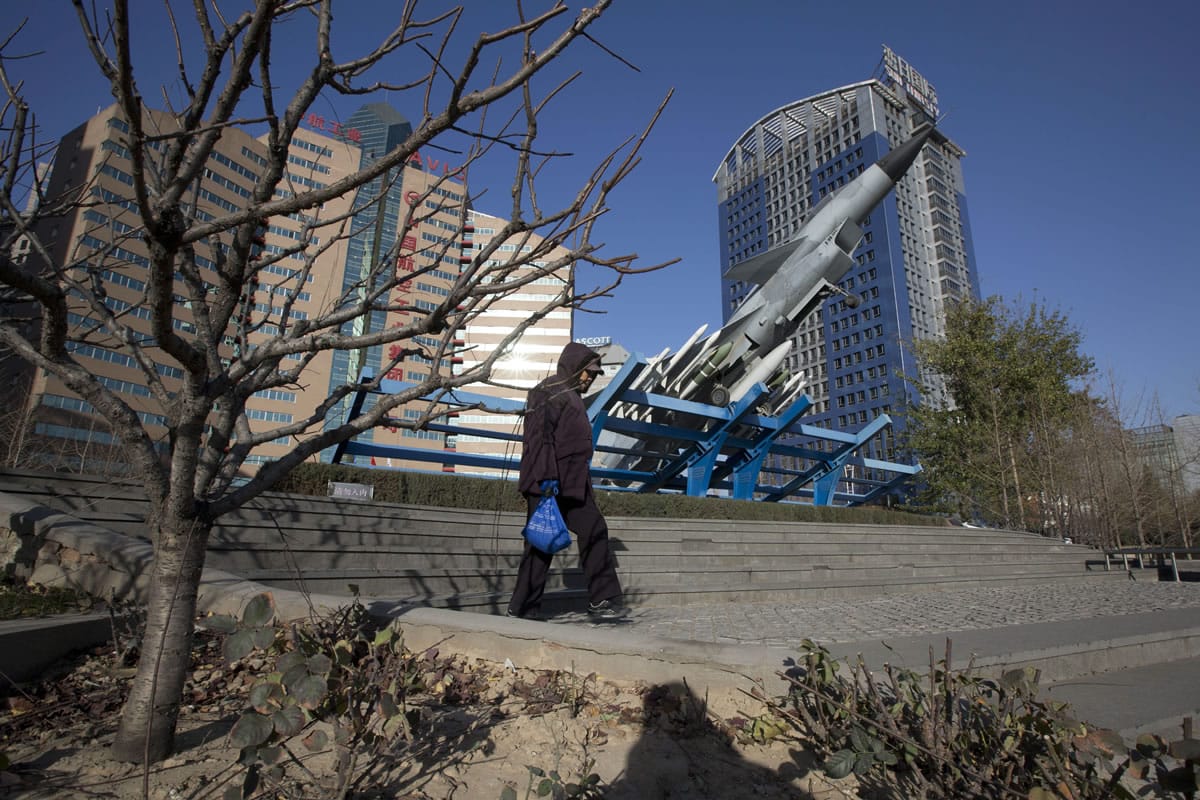BEIJING — China acknowledged Wednesday it let two American B-52 bombers fly unhindered through its newly declared air defense zone in the East China Sea despite its earlier threat to take defensive measures against unidentified foreign aircraft.
The U.S. flights, which tested the Chinese zone for the first time since it was declared over the weekend, raised questions about Beijing’s determination to enforce its requirement that foreign aircraft identify themselves and accept Chinese instructions.
China’s lack of any action suggested that it was merely playing out a diplomatic game to establish ownership over the area rather than provoke an international incident.
The flights followed days of angry rhetoric and accusations over Beijing’s move, designed to assert Chinese claims to a group of uninhabited islands controlled by Japan.
The U.S. and Japan have said they don’t acknowledge the zone, and Taiwan and South Korea, both close to the U.S., also rejected it.
A Chinese Defense Ministry statement said the U.S. planes were detected and monitored as they flew through the area for two hours and 22 minutes. It said all aircraft flying through the zone would be monitored and that “China has the capability to exercise effective control over the relevant airspace.”
Asked repeatedly about the incident at a regularly scheduled briefing, Foreign Ministry spokesman Qin Gang said it had been handled according to procedures laid out in the Saturday statement but offered no specifics.
“Different situations will be dealt with according to that statement,” Qin said.
The U.S., which has hundreds of military aircraft based in the region, described the flights as a training mission unrelated to China’s announcement of the zone. U.S. officials said the two unarmed B-52 bombers took off from their home base in Guam around midday and were in the zone that encompasses the disputed islands for less than an hour before returning to their base, adding the aircraft encountered no problems.
The bomber flights came after State Department spokeswoman Jen Psaki said China’s move appeared to be an attempt to change the status quo in the East China Sea.
“This will raise regional tensions and increase the risk of miscalculation, confrontation and accidents,” she told reporters.
Australia, meanwhile, said it called in the Chinese ambassador to express concern about the sudden zone declaration.
“The timing and the manner of China’s announcement are unhelpful in light of current regional tensions, and will not contribute to regional stability,” Australian Foreign Minister Julie Bishop said in a statement.
Beijing’s move fits a pattern of putting teeth behind its territorial claims and is seen as potentially leading to dangerous encounters depending on how vigorously China enforces it — and how cautious it is when intercepting aircraft from Japan, the U.S. and other countries.
China is sending its sole aircraft carrier to the South China Sea for its first sea trial, alarming the Philippines, which has conflicting claims with Beijing over parts of the region. Manila said the aircraft carrier’s presence in the sea threatens regional stability.
Chinese reaction to the U.S. bomber flights was predictably angry, with some recalling the 2001 collision between a Chinese fighter and a U.S. surveillance plane in international airspace off China’s southeastern coast — the kind of accident some fear China’s new policy could make more likely. The Chinese pilot, Wang Wei, was killed in the crash and the U.S. crew forced to make a landing on China’s Hainan island, where they were held for 10 days and repeatedly interrogated before being released.
“Let’s not repeat the humiliation of Wang Wei. Make good preparations to counterattack,” wrote Zheng Daojin, a reporter with the official Xinhua News Agency on his Twitter-like Weibo microblog.
Businessman Li Pengliang said the island dispute had heightened anti-Japanese sentiment, but doubted the chances of an open conflict.
“The public is outraged, but I still believe that the leaders in power are sober minded. They will not act on impulse,” Li said.
Still others criticized the government’s handling of what they termed a battle of psychological pressure and international public opinion.
“China is terrible at telling its side of the story. The silent one is the loser so why don’t they better explain our response to the American bomber flight,” wrote Hu Xijin, editor of the nationalist tabloid Global Times, on his blog.
It wasn’t clear whether Beijing had anticipated the forceful response from Washington and others, or how well it is prepared to back up its demands.
Chinese scholars, who often serve as ad-hoc government spokesmen, criticized Tuesday’s flights as a crude show of force and said Beijing wasn’t looking for a fight.
“It’s not that China didn’t want to enforce its demands, but how do you expect China to react?” said Zhu Feng, an international security expert at Peking University.



